This text will be comparing two mattresses from companies that hail from Canada. We’ve taken a look at both the Douglas and the Endy by Goodmorning.com individually (links below…wait for it…), but there are some questions that can only be answered when sizing up the two head-to-head.
Comparisons are great to help finalize a buying decision — this is where the big spotlight goes on the small details. By the end of this write-up, you should have a much better idea of which mattress is best for you. If you’re in a pinch, check comparison summary.
Without further ado, let’s get into the Douglas vs Endy comparison!
Editor’s Note: The Douglas mattress has changed since we originally wrote this review and has been designed to feel firmer for the average-weight sleeper. We plan to update this review with more up-to-date information once we have re-tested the Douglas mattress.
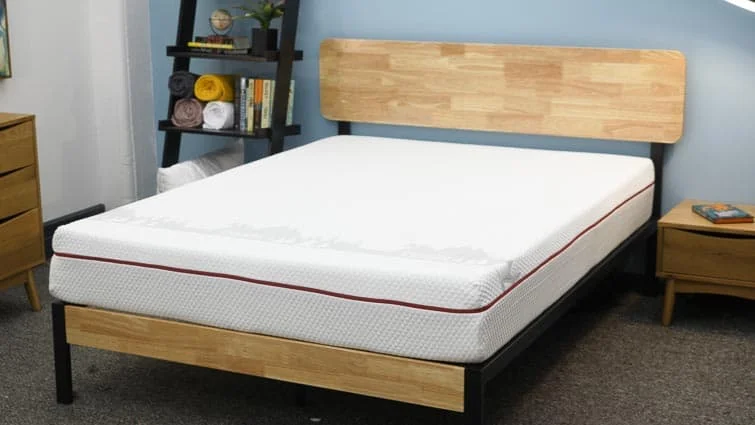 | 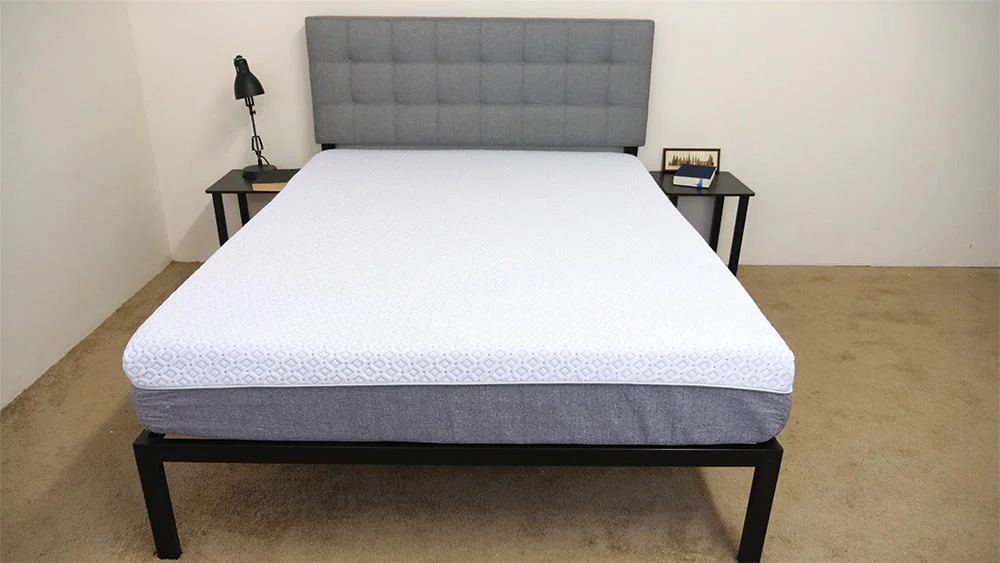 | |
| Douglas Mattress | Endy Mattress | |
| Rating | ||
| Firmness | Medium-soft: 6/10 | Medium-soft: 6/10 |
| Material | Foam | Foam |
| Cooling | — | — |
| Best For | Side Sleepers, Back Sleepers | Back Sleepers, Hip Pain |
Douglas vs Endy Mattress Review
Douglas vs Endy: Which is Better for You?
The Douglas is an all-foam, soft mattress with cooling gel, impressive edge support, and motion isolation. The Endy is a memory foam mattress with a medium-firm feel and open-celled foam for cooling. The Douglas will shape to your body, while the Endy focuses on pressure relief and support.
Depending on your size and personal preferences, you may prefer one over the other. Let’s see what’s best for you!
Who Should Buy Douglas
- Side sleepers who enjoy a plush mattress that relieves pressure and contours to the body.
- The Douglas sleeps quite cool, making it a hit for hot sleepers.
- Combo sleepers will appreciate how easy it is to change positions, plus for those who like memory foam, it has a contouring feel.
Who Should Buy Endy
- Sleepers who enjoy a classic, medium-firm feel.
- Strict back sleepers looking for pressure relief.
- The Endy has a decent amount of bounce and responsiveness, making it not a bad choice for sex.
Douglas vs Endy: Similarities and Differences
The Douglas and Endy do share some important features, like both being bed-in-a-box mattresses from Canada. Before moving into what makes them unique, let’s look at the details that put them in the same weight class.
Main Similarities
- All foam – Both Canadian mattresses are made from three different layers of foam. The layers nearest to the sleeper help the mattress sleep cool, and both beds use HD poly foam at the base to provide shape and stability.
- Initial feel – The Douglas and the Endy both give you a soft landing on first contact. Both beds feature memory foam in the comfort layer, which is made to contour around your body a bit, creating a comfortable cushion with pressure relief for sensitive areas around the body.
- Price range – Keep your eye open for sales, but generally, the Douglas and the Endy retail for similar prices.

Main Differences
- Warranty Douglas offers a 20-year warranty, compared to Endy’s 15-year warranty.
- Sleep Trial – Douglas allows you to try the Douglas for up to 365 nights, while the Endy only offers a 100-night sleep trial.
- Side sleepers – Overall, the Endy doesn’t provide the cushioning side sleepers need to tackle pressure points, while the Douglas should please them just fine.
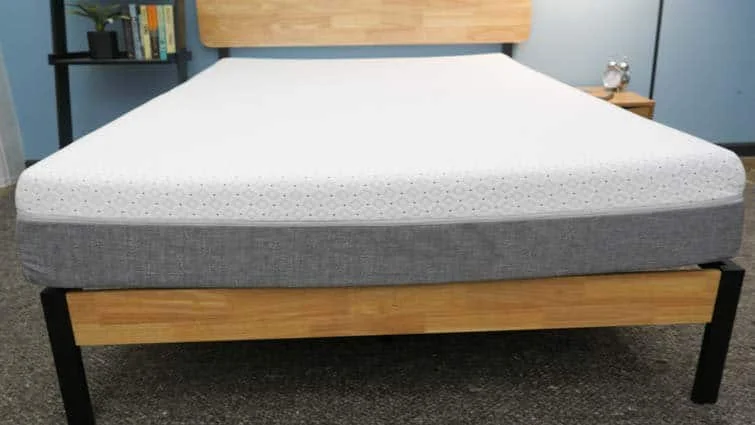
Douglas and Endy Mattress Feel Comparison
I start with a firmness test to assess the feel of a mattress. I run my tests with my co-workers of various body weights, shapes, and sizes. I rate firmness on a scale of 1 to 10 (6.5 being the industry standard balance for a medium-firm mattress). The number you see here is the average of what we all found.
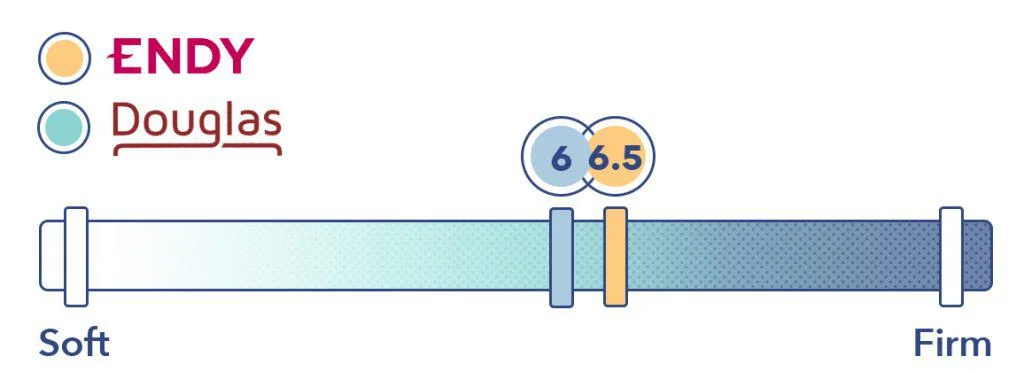
Douglas
I gave the Douglas bed a firmness rating of 5.5 out of 10, which is a softer feel than average. I felt this softness as soon as I laid on the mattress i.e. I sank right into the comfort layer of the bed. This contouring was nice at first, but I felt the support give too much in the hips over time on my back and stomach. Too much give in the hips leads to spinal misalignment, which is definitely not comfortable after a full night’s sleep. However, this same pressure relief felt nice at my hips and shoulders when lying on my side.
Heavier sleepers will probably feel even more give than I did at 190 lbs. This means less support in the hips for strict back and stomach sleepers. This is just one example of when softer isn’t always better!
Endy
I gave the Endy an average firmness score of 6.5 out of 10. This is a medium–firm feel. The mattress gave me a good balance between support and pressure relief in all sleeping positions — at first. The firm nature of the mattress also meant good mobility. However, support, pressure relief, and mobility may change over a full night’s sleep. I’ll talk more about that below. You can also find some great information in the Bounce and Pressure Relief sections at the Douglas and Endy reviews.
The comfort layer allowed me to sink into it slightly when on my back, but I never felt stuck in the mattress. However, over time the mattress led to some discomfort on my side and on my stomach. There was not enough pressure relief in my shoulders when on my side, and there was too little support in my hips when on my stomach. Both situations meant spinal misalignment over a full night, which can lead to pain in the morning. Strict back sleepers should feel comfortable on the Endy, and combo sleepers should get a good night’s sleep as well.
Comparing What it’s Like to Sleep on the Douglas and the Endy
Everybody feels each mattress differently, whether it’s due to their weight, preferred sleeping position, or another one of many characteristics. Let’s see how the Endy vs Douglas rivalry competes for a variety of different sleepers down below.
Douglas
Back — I found this position to be far too soft for the needs of these sleepers. The Douglas had a bit too much give, which means less support.
Side — I believe the Douglas will work better with side sleepers. Folks who go to bed in this position and stick there often find their shoulders and hips jammed up on firmer mattresses. The pressure relief from the conforming comfort and transition layers works wonders for nighttime comfort in the side position.
Stomach — I think stomach sleepers could agree with back sleepers in the fact that this bed offers little support. The give of this bed caused my hips to sink, creating an environment for an uncomfortably misaligned spine.
Body Weight — If you’re under 130 lbs, you will feel the soft pressure relief that’s intended with this mattress. Sleepers over 250 lbs may want to look elsewhere. This mattress is likely too plush for your needs, which can lead to spinal misalignment.
Endy
Back — Considering the slightly firmer profile of the Endy, I believe that strict back sleepers have a winner here. There is support for the spine in the poly foam transition layer along with a good level of comfort from the open cell memory foam layer above it.
Side — On my side, I experienced a bit of discomfort. I found that the Endy didn’t provide enough pressure relief in my shoulders and a misaligned spine. For another option, I’d recommend checking out our best mattresses for side sleepers.
Stomach — Similarly to my side sleeping experience, support was lacking, but this time in my hips. This discomfort will also likely lead to the spine being placed in an unhealthy position throughout the night, which could mean more pain when you wake up. Our best mattresses for stomach sleepers may have some more suited options.
Body Weight — If you’re a lighter sleeper, I think that this bed could offer a good amount of pressure relief and support for you. Heavier sleepers over 250 lbs could find the bed to be too soft, requiring more support and relief. For additional options, you can check out our best mattresses for heavy people.
Comparing Douglas and Endy Prices
Price can definitely make or break how you decide upon your choice of mattress. Below, you’ll find the pricing chart for both the Douglas and Endy models.
Prices listed will be before discount or offer for each size.
| Size | Endy | Douglas |
|---|---|---|
| Twin | $675 CAD | $599 CAD |
| Twin XL | $700 CAD | $629 CAD |
| Full | $775 CAD | $679 CAD |
| Queen | $850 CAD | $749 CAD |
| King | $950 CAD | $849 CAD |
| California King | $950 CAD | $849 CAD |
Douglas vs Endy
Product
Firmness
Score
Comparing Douglas and Endy Mattress Materials
The similarities of the Douglas and the Endy give a good context to their differences. It’s clear, then, that the devil really is going to be in the small details that separate these two products. To get in as much information as possible, I’ll provide a quick snapshot of each bed’s construction. These are my top level takeaways, but you can always find out more by checking out my full Douglas mattress review, as well as my full Endy mattress review!
Douglas
- Cover – The removable Douglas cover is made of an all-natural, machine-washable Tencel blend that’s soft to the touch and creates breathability. (and made from eucalyptus trees!)
- Comfort Layer – Moving below the mattress cover, the Douglas uses 2” of ecoLight® cooling gel foam as its comfort layer. As you might guess from the name, yes, it’s eco-friendly! The memory foam gives a nice contouring feel while the gel infusion helps to mitigate memory foam’s tendency to trap and absorb body heat. The bottom line: The sleeper can comfortably sink into the mattress a bit without overheating.
- Transition – The Elastex transition layer is still soft, but sturdier than the gel memory foam above it. This latex alternative provides mobility and support at the same time. It is also slightly more breathable than pure latex, which keeps the bed cool.
- Base – After the Elastex layer, 6” of HD poly foam gives the Douglas its framing and keeps the sleeper from sinking too far into the comfort and transition layers.
Thoughts: The Douglas should appeal to sleepers who want a softer mattress. Side sleepers and others who need pressure relief should find plenty of it here, because the Douglas is made to shape itself to the sleeper’s body.
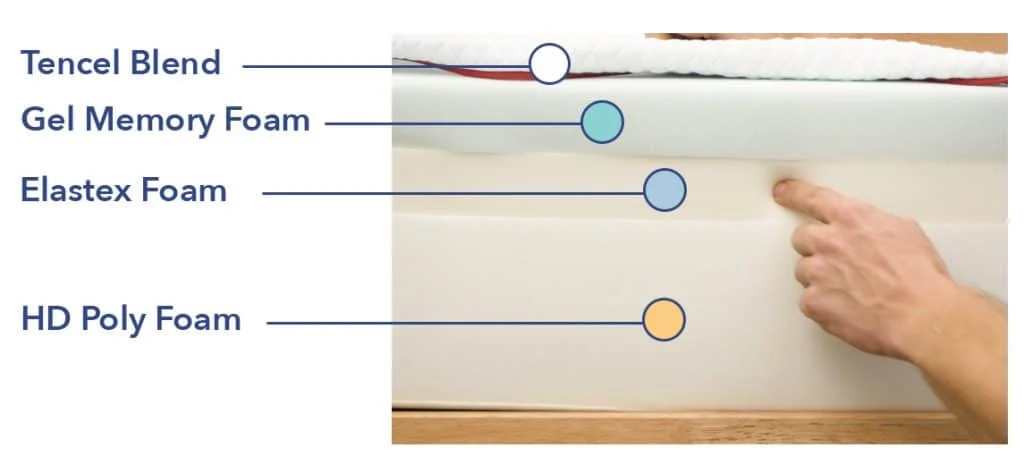
Endy
- Cover – Starting off, the Endy has a flexible poly knit mix in its cover that takes its inspiration from the stretchy nature of athletic clothing.
- Comfort Layer – After the cover comes a top layer of open-cell memory foam, which gives a good mix of support and pressure relief. As with the gel infusion we saw in the Douglas, an open-cell modification on memory foam helps to curb its tendency to overheat.
- Transition – The slightly firmer poly foam layer under the memory foam keeps the sleeper from sinking too far into the mattress. I get full body support without losing the comforting relief of the memory foam layer.
- Base – The Endy gets its core foundation from the HD poly foam at the base of the mattress.
Thoughts: Most sleepers should find that the Endy provides a good balance between pressure relief and support. Although slightly firmer than the Douglas overall (for most people), it’s not a hard mattress that immediately jams up the hips and shoulders.
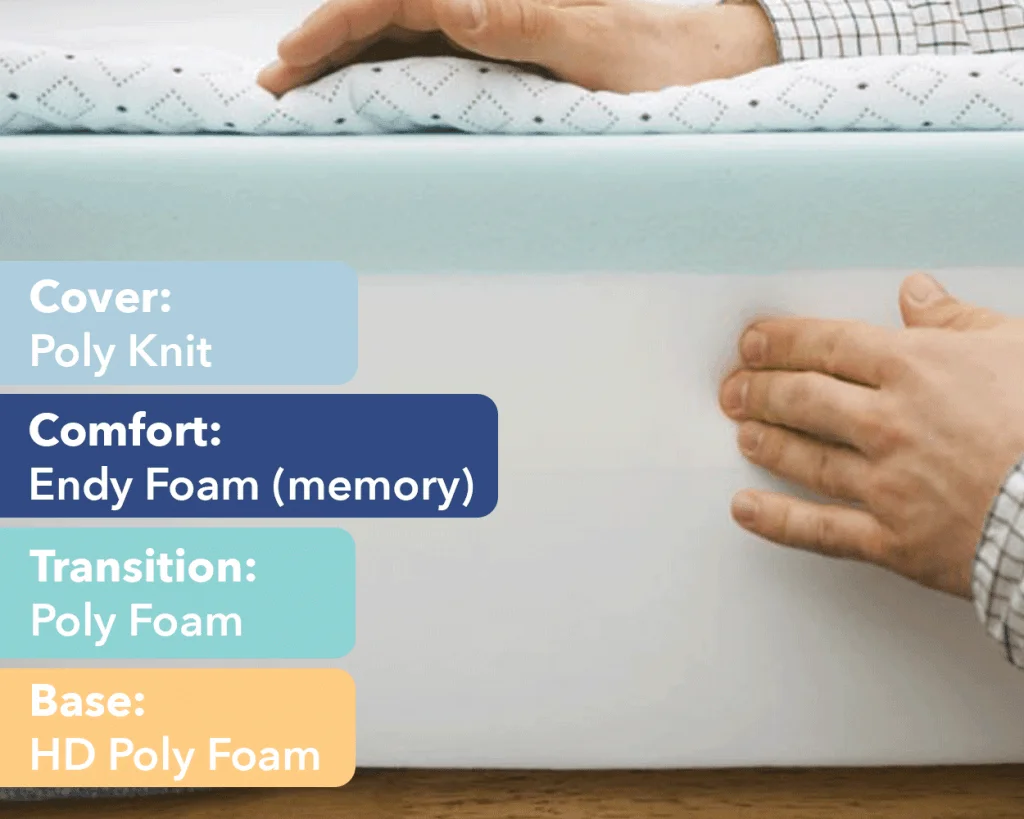
Douglas vs Endy
Product
Firmness
Score
Douglas vs Endy: Best Qualities
Though these all-foam mattresses are similar, each has some defining qualities that helps each stand on their own. Whether you’re a solo sleeper or in a couple, a side sleeper or a back sleeper, you have preferences and needs that are important to find in a new mattress. Below, we’ll assess the best parts of both the Douglas and the Endy.
Douglas Best Features
- Strict side sleepers get a lot of pressure relief in the shoulders and hips because of the Douglas’ softer overall profile. This keeps the spine aligned and prevents pressure hotspots from forming in these areas over time.
- If you sleep with a restless partner, the Douglas tends to have impressive motion isolation. It also has good edge support, which means more room for each sleeper on the bed. Both things are good for couples.
Endy Best Features
- The Endy sleeps quite cool because of the breathable cover and open cell foam comfort layer. If you tend to overheat at night, the Endy should provide some relief for you!
- Combo sleepers should find a lot to love with the Endy because of its good mobility and balance between pressure relief and support. The Endy initially feels good in all positions, so you don’t have to worry so much about pressure points or spine misalignment if you are always switching.
Comparing Company Policies
Douglas Policies
- Trial Period – 365 nights
- Shipping – Free
- Mattress Warranty – 20 years
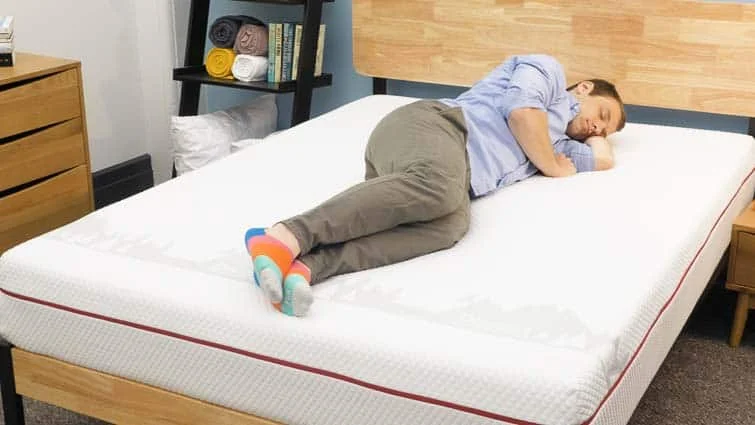
Endy Policies
- Trial Period – 100 nights
- Shipping – Free
- Mattress Warranty – 15 years
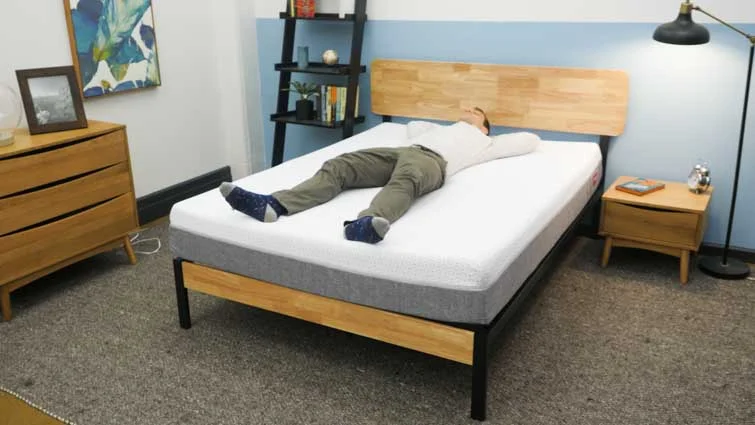
Comparing Douglas and Endy Customer Service
Here at Sleepopolis, we rate customer service with a scale based on our own experience with each team. Our ratings include Stellar, Great, Satisfactory, Poor. Head below to see how each did!
Douglas Sleepopolis Customer Service Rating
- Satisfactory: When I clicked the chat button on Douglas’ site, it offered me both French and English options, which I saw as a great benefit. However, when I went into the chat, I was welcomed by a bot and it seemed difficult to connect with a real person at first. I was connected with a real representative within about 3 minutes.
Endy Sleepopolis Customer Service Rating
- Great: When I clicked the chat button on Endy’s site, it began with a bot. After sending one initial message asking if a bed frame was needed, I was welcomed by a “get in touch” message that I clicked. This led me to two options: Live Chat or Leave a Message. I chose the live chat option and was responded to within seconds!
Other Douglas and Endy Comparisons
Read below to see the other mattress brands commonly compared to the Douglas and Endy!

























